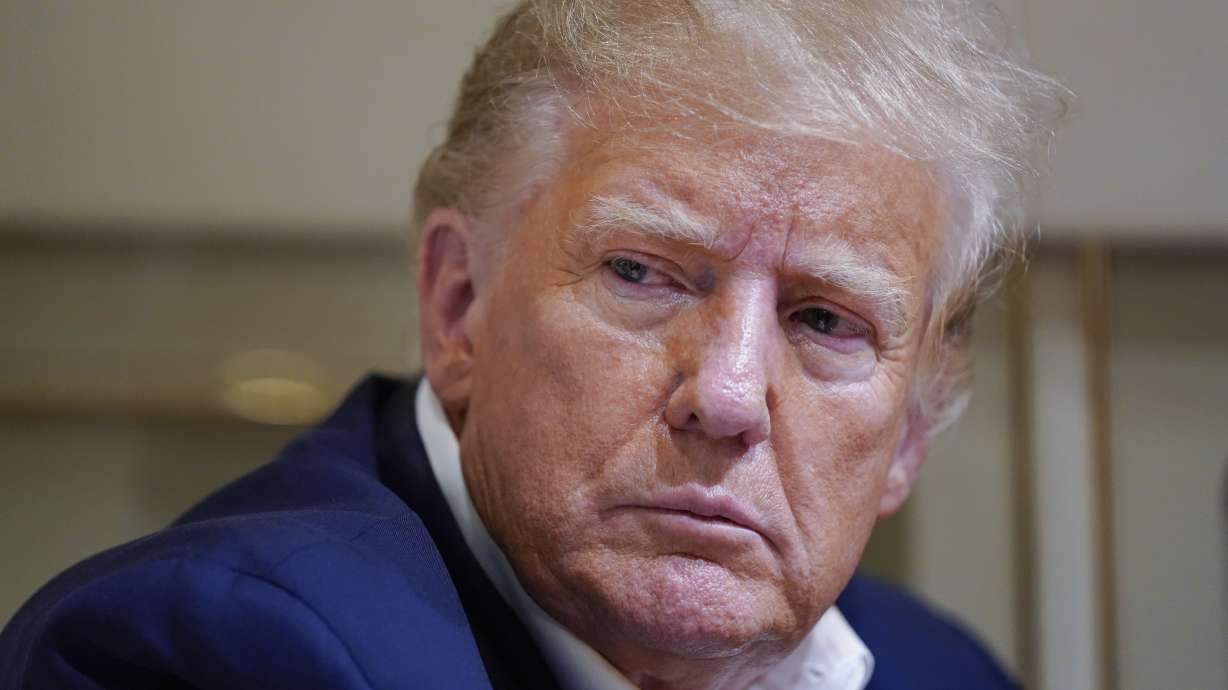Estimated read time: 4-5 minutes
This archived news story is available only for your personal, non-commercial use. Information in the story may be outdated or superseded by additional information. Reading or replaying the story in its archived form does not constitute a republication of the story.
SALT LAKE CITY — Utah Sen. Mike Lee took issue with the recent decision by Maine's secretary of state to bar former President Donald Trump from the state's primary ballot, arguing that a provision of the 14th Amendment doesn't apply to the president.
Maine is the second state to bar Trump from the ballot, after the Colorado Supreme Court ruled last week that Trump's role in the Jan. 6, 2021, U.S. Capitol attack amounts to insurrection.
The full text of Section 3 of the 14th Amendment, which is the basis of the court's decision, reads:
"No person shall be a senator or representative in Congress, or elector of president and vice president, or hold any office, civil or military, under the United States, or under any state, who, having previously taken an oath, as a member of Congress, or as an officer of the United States, or as a member of any state legislature, or as an executive or judicial officer of any state, to support the Constitution of the United States, shall have engaged in insurrection or rebellion against the same, or given aid or comfort to the enemies thereof. But Congress may by a vote of two-thirds of each House, remove such disability."
Lee took to social media on Thursday night to criticize Maine Secretary of State Shenna Bellows for her decision to bar Trump from the ballot, saying Trump had not engaged in insurrection, and even if he had, says the 14th Amendment wouldn't apply to him.
"If Maine Secretary of State Shenna Bellows had read the Constitution, she'd have noticed that Section 3 of the Fourteenth Amendment refers to senators, representatives, and presidential electors, but not presidents. There's a reason it doesn't. She didn't bother to ask why," he posted.
"An 'officer of the United States' is appointed by the president unless the law gives appointment power to someone else," he said in another post. "The president isn't 'an officer of the United States.' The presidency is thus not covered by Section 3 of the Fourteenth Amendment."
In a later post on Friday morning, Lee said, "Libs aren't dumb. They know how to read. But sometimes they refuse to do so."
It's not just liberals who support the argument that Trump's actions bar him from holding office again; some conservatives and legal scholars agree with the argument adopted by the Colorado Supreme Court.
Conservative legal scholar J. Michael Luttig and liberal law professor Laurence Tribe promoted the idea in August, writing in the Atlantic that the 14th Amendment "contains within it a protection against the dissolution of the republic by a treasonous president."
They also argue that a president wouldn't need to be convicted of insurrection or rebellion to be barred from office, because the "disqualification clause operates independently of any such criminal proceedings and, indeed, also independently of impeachment proceedings and of congressional legislation."
A Congressional Research Service report published in September makes the same argument, stating that "Section 3 of the 14th Amendment does not expressly require a criminal conviction, and historically, one was not necessary."
Although Trump has not been criminally charged with insurrection, a district court in Colorado concluded that the former president did indeed engage in insurrection "as those terms are used in Section Three" following a five-day civil trial.
The Colorado Supreme Court's decision affirmed that finding, while it overruled the district court's decision that the president is not covered by the disqualification clause.
A spokesman for Lee did not respond to a request for clarification or comment, but the senator told the Deseret News in August that he believes the theory that Trump is ineligible under Section 3 "rests on a tortured reading of the Constitution."
He said at the time that he "essentially" agrees with arguments made by John Yoo, a professor of law at the University of California at Berkeley, which were articulated in an article for the Federalist along with Robert Delahunty.
Yoo and Delahunty distinguish between "rebellion" and "insurrection," and argue that Trump "may have been an 'insurrectionist' but not a 'rebel.'"
However, they appear to discount the argument that the disqualification clause doesn't cover the president, writing, "Although it does not explicitly refer to presidents or presidential candidates, comparison with other constitutional texts referring to 'officer(s)' supports the interpretation that it applies to the presidency too."
Trump's team has promised to appeal the decision in Maine, and Republicans have challenged the ruling of the Colorado Supreme Court. The Michigan Supreme Court declined to hear an appeal of a lower court ruling earlier this week, meaning Trump will stay on the ballot in that state.
The question of Trump's eligibility is likely to come before the U.S. Supreme Court, as many states will hold presidential primary elections or caucuses in the coming months.









